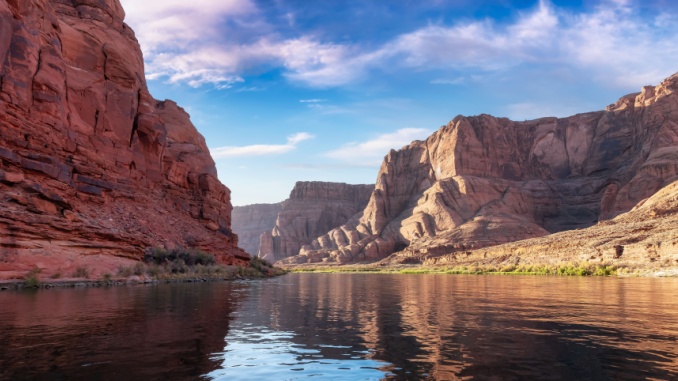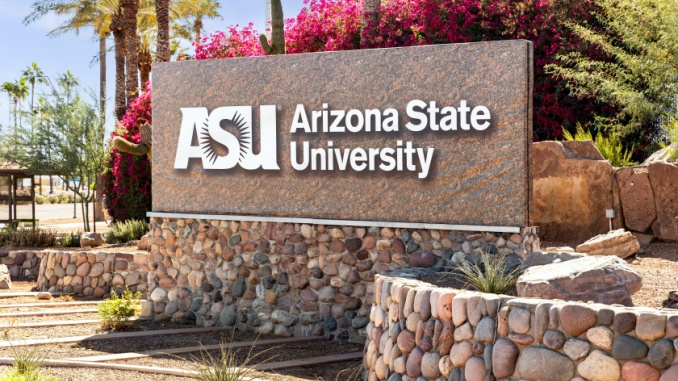
by Matthew Holloway | Feb 10, 2026 | News
By Matthew Holloway |
New Legislation requiring continuous electronic monitoring for certain registered sex offenders who lack a fixed residence advanced out of a key legislative committee last week.
House Bill 2413, sponsored by Rep. Quang Nguyen (R-LD1), chairman of the House Judiciary Committee, was approved by that Committee and is bound for the House Rules Committee before heading to the House floor for consideration.
The bill would amend existing law to require courts to place any registered sex offender without a permanent address on a global positioning system (GPS) or other electronic monitoring until a residence is established.
As explained in a news release, the bill “closes a serious gap in current law by ensuring offenders who cannot be reliably located are continuously monitored, strengthening accountability and protecting Arizona communities.”
Under current statute, sex offenders who are homeless may register as transients and periodically update their status, a gap Nguyen’s bill aims to close. HB 2413 also directs the Arizona Department of Public Safety to oversee compliance with the monitoring requirement.
“Public safety in Arizona is not negotiable,” Rep. Nguyen said. “If a registered sex offender cannot tell authorities where they live, the public should not be left guessing where they are. This bill puts accountability first and gives law enforcement the tools they need to track offenders who would otherwise be difficult to locate.”
House GOP leaders stated, “House Republicans have made clear that protecting communities requires firm enforcement, clear standards, and consequences that are enforced.”
HB 2413 advances the House Republican Majority Plan’s public safety pillar, which emphasizes enforcing the rule of law and prioritizing the safety of families and neighborhoods.
Under the bill language summarized by legislative tracking services, the monitoring requirement would be in addition to any supervision already in place for offenders on probation, parole, or other court orders.
The committee vote was 5–4 along party lines, with the bill clearing the Judicial Committee and moving to the Rules Committee, before going to the full House for a potential floor vote.
Matthew Holloway is a senior reporter for AZ Free News. Follow him on X for his latest stories, or email tips to Matthew@azfreenews.com.

by Matthew Holloway | Feb 10, 2026 | Economy, News
By Matthew Holloway |
Legislation aimed at easing regulatory barriers for next-generation nuclear power projects in rural Arizona advanced last week after clearing a key House committee.
The House Natural Resources, Energy, and Water Committee approved House Bill 2795, sponsored by Arizona Rep. Michael Carbone (R-LD25). The bill would limit the ability of county zoning ordinances to block small modular nuclear reactor projects once federal safety, permitting, and public notice requirements have been satisfied.
Under HB 2795, counties would be prohibited from denying zoning approval for a small modular reactor after a project completes federal design certification and site permitting, and once those approvals are formally presented to local boards of supervisors.
Small modular reactors, or SMRs, are a class of nuclear reactors designed to generate electricity on a smaller scale than traditional nuclear plants. They are typically factory-built, use standardized designs, and incorporate passive safety systems that rely on natural physical processes, such as gravity and convection, rather than active mechanical controls. Developers and regulators have promoted SMRs as a potential option for expanding reliable, carbon-free energy generation, particularly in remote or rural areas.
“Advanced nuclear reactors are coming, and we need to be prepared,” Carbone said in a statement following the committee vote. He added, “We need these projects to keep up with China and compete on national security.”
Carbone continued, “Educating the public remains the number one issue, but I believe when members of the public see the facts, they will understand the substantial benefits these projects can bring. Small modular reactors offer safe, clean, reliable power with high-paying jobs and opportunities for economic development—especially in our rural areas. HB 2795 ensures that when federal safety standards are met, and the public has had its say, local zoning cannot be used to block these critical projects that can secure our future energy supply.”
Carbone said the bill preserves public input through the federal permitting process while preventing counties from blocking projects after those regulatory steps are complete.
In a related op-ed, Carbone and James Taylor (R-LD29) wrote that modern nuclear reactor designs are significantly safer than earlier generations, citing advances in passive safety systems and next-generation technologies.
They wrote:
“Fears of radioactivity and nuclear fallout sparked protests and public opposition, leading countries like Germany to dismantle reactors that were operating safely. Those memories linger today and often fuel organized resistance in local communities whenever new reactors are proposed.”
“The fear is understandable. Lives were lost, radiation was released, and entire communities were evacuated, with some residents never able to return. As tragic as those incidents were, it is important to understand why they occurred and why modern reactor designs address the specific failures that caused them.”
In the op-ed, the lawmakers pointed to features such as passive cooling systems, non-pressurized designs, and fail-safe mechanisms intended to address the conditions that contributed to past nuclear accidents, including Three Mile Island, Chernobyl, and Fukushima.
The lawmakers also noted that advanced reactor concepts, such as molten salt and sodium-cooled designs, reduce reliance on active mechanical systems and external power sources.
Supporters of HB 2795 say the legislation aligns with broader efforts to expand reliable power generation, support rural economic development, and prepare for projected increases in electricity demand.
The bill now advances to the House Rules Committee before moving to the House floor, where it will be debated and voted upon.
Matthew Holloway is a senior reporter for AZ Free News. Follow him on X for his latest stories, or email tips to Matthew@azfreenews.com.

by Matthew Holloway | Feb 9, 2026 | News
By Matthew Holloway |
The Arizona House of Representatives nearly unanimously approved legislation on Tuesday to increase funding for the state’s legal defense fund related to Colorado River water rights, advancing the measure to the Arizona Senate. The bill passed the House with 56 votes in favor and 4 members not voting.
The measure, known as House Bill 2116, sponsored by Rep. Gail Griffin (R-LD14), and supported by fellow Republican Reps. Pamela Carter and Matt Gress of Legislative District 4, would appropriate $1 million from the state’s general fund to the Colorado River Litigation Fund for fiscal year 2026-27.
“Waiting until a lawsuit is filed to start planning would be reckless,” Griffin told AZ Family. “HB 2116 puts Arizona on offense, not defense.”
The Colorado River Litigation Fund was created during the 2025 legislative session to ensure that Arizona could pursue or defend legal action if disputes arise over its legally entitled share of Colorado River water.
In a joint news release, Carter said the additional funding would help protect Arizonans’ water supply by preparing the state for litigation if interstate negotiations fail. She noted that cities, including Phoenix and Scottsdale, remain dependent on water delivered through the Central Arizona Project (CAP).
“We must ensure a safe and reliable water supply for our residents,” Carter said in a statement. “If other states refuse to honor the Compact, we have to be ready to defend our rights in court. HB 2116 ensures Arizona is not caught flat-footed if negotiations fail and litigation becomes unavoidable. I voted yes to protect our water supply, families, jobs, and future.”
Gress emphasized that proactive funding was necessary in case the governor could not secure a satisfactory agreement in ongoing multistate negotiations over river water allocation, saying, “No one wants to go to court over water, but ignoring the risk of litigation would be irresponsible. This funding gives Arizona the ability to defend itself and its rights if the Governor fails to reach a fair agreement. When the water supply of millions of Arizonans and our state’s economy are on the line, every step we take in preparation matters.”
Griffin, chair of the House Natural Resources, Energy and Water Committee, also issued a statement highlighting the importance of readiness. “Other states have been positioning themselves for court long before this fund was created. Hopefully the fund will not be needed, but if it is — this bill makes sure that Arizona is ready to defend the water that millions of people and billions of dollars of economic activity depend on,” she said.
The House approved HB 2116, following bipartisan support in the House Natural Resources, Energy and Water Committee and the Appropriations Committee, and with unanimous approval from the House Rules Committee.
About 36 percent of Arizona’s water supply is drawn from the Colorado River, a resource shared by seven Western states that are currently negotiating a post-2026 operating agreement. If states fail to reach a new deal by the federal government’s deadline of Feb. 14, 2026, federal authorities could impose their own rules on water cuts.
Arizona’s top elected officials, both Republican and Democrat, penned a joint letter in November 2025, urging federal action in the absence of an agreement between the seven Colorado River Basin states. The letter cited the upper basin states’ refusal to commit to verifiable conservation.
In the news release from House GOP Leaders, they note, “Officials from Upper Basin states have openly stated they want to see [Central Arizona Project] CAP deliveries cut before accepting reductions themselves, despite their legal obligation under the 1922 Colorado River Compact to deliver minimum flows to Lower Basin states like Arizona.”
State leaders and stakeholders have increasingly framed the funding boost as a precautionary legal strategy amid complex negotiations and possible delivery shortfalls, as reported by KJZZ. Some water policy analysts say litigation may be difficult to avoid given entrenched positions among basin states; others urge continued negotiation to reach a sustainable agreement without court involvement.
The bill now moves to the Arizona Senate for further consideration.
Matthew Holloway is a senior reporter for AZ Free News. Follow him on X for his latest stories, or email tips to Matthew@azfreenews.com.

by Matthew Holloway | Feb 7, 2026 | News
By Matthew Holloway |
A slate of bills designed to strengthen oversight of Arizona’s Supplemental Nutrition Assistance Program (SNAP) advanced Monday as House Republicans moved to implement federal reforms enacted under H.R. 1. The bills include new work requirements, stricter eligibility verification, and measures to reduce payment error rates
The actions follow a separate advancement of Medicaid and health-related bills tied to federal H.R. 1 reforms by the Arizona House Health and Human Services Committee, part of a broader state response to changes enacted under the federal budget reconciliation act.
House leaders said the measures correspond to provisions in the federal law signed into effect on July 4, 2025, which included updates to SNAP work requirements, eligibility criteria, and administrative rules.
“H.R. 1 made it clear that work expectations and eligibility rules matter again,” Committee Chairman Rep. Selina Bliss (R-LD1) said. “Our SNAP reforms reinforce responsibility while protecting parents, seniors, and the disabled. This package keeps the program strong so it can continue serving families who qualify and rely on it.”
Key bills advanced under the SNAP reform package include measures to tighten employment and training provisions for SNAP participants, adjust work requirement waivers, and increase data verification for eligibility determinations. The bills advanced with a ‘Do Pass’ recommendation 7-4.
One bill, HB 2206, would require the Arizona Department of Economic Security to reduce the SNAP payment error rate to 3 percent — a target state lawmakers say could reduce improper payments and lower the risk of federal cost-sharing penalties tied to high error rates under H.R. 1.
Failure to act, Republican lawmakers said, could expose Arizona to federal penalties related to improper payments and high error rates, effectively shifting more program costs onto state taxpayers. According to legislative budget estimates, the reduction would save taxpayers tens of millions of dollars annually.
“SNAP should be a hand up, not a blank check,” House Majority Leader Michael Carbone (R-LD25) said. “When benefits flow to people who no longer qualify or who do not even live here, the program is weakened for families who truly need help. These bills tighten eligibility, reinforce work expectations, and protect taxpayers while keeping SNAP available for the vulnerable.”
Mandatory employment and training requirements for certain SNAP recipients are addressed in HB 2442, which would align Arizona law with updated federal work provisions enacted under H.R. 1. The bill requires eligible participants to engage in job readiness, employment, or training activities as a condition of receiving benefits, reflecting federal standards adopted through the reconciliation package.
HB 2448 focuses on waivers and exemptions for work requirements, narrowing the circumstances under which SNAP recipients may be exempted from employment obligations. The legislation responds to federal changes limiting broad waiver authority and seeks to ensure exemptions are applied more narrowly and in accordance with updated eligibility rules.
Expanded eligibility verification requirements for SNAP and other public assistance programs are proposed under HB 2797, which applies additional data checks to confirm income, employment status, residency, and overall eligibility. The bill also directs suspected fraud cases to be referred for further review, including potential federal prosecution.
The committee’s agenda also included adjustments to employment reporting requirements for able-bodied adults without dependents and limits on backdoor waivers unless approved by the Legislature.
Matthew Holloway is a senior reporter for AZ Free News. Follow him on X for his latest stories, or email tips to Matthew@azfreenews.com.

by Matthew Holloway | Feb 6, 2026 | Education, News
By Matthew Holloway |
Arizona State University (ASU) professor Dr. Owen Anderson has asked the Arizona Supreme Court to hear his case challenging mandatory diversity, equity, and inclusion (DEI) training after a lower court dismissed his lawsuit, according to a petition filed this week by the Goldwater Institute.
Anderson, a philosophy and religious studies professor at ASU, originally filed the lawsuit in 2024 against the Arizona Board of Regents. He argued that the university’s required “Inclusive Communities” DEI training violated an Arizona statute that prohibits public agencies from making employees participate in training that “presents any form of blame or judgment on the basis of race, ethnicity, or sex.” Arizona Senate President Warren Petersen (R-LD14) and then-House Speaker Ben Toma (R-LD27) filed an amicus brief in support of Dr. Anderson’s lawsuit.
According to the Goldwater Institute’s petition, Anderson objects to the DEI training materials, saying they include concepts about race and identity that he believes are unlawful under state statute.
“No one should be forced to participate in divisive DEI training or endorse race-based ideology as a condition for holding a government job. That’s exactly why Arizona lawmakers banned mandatory trainings that teach discriminatory ideas about race, ethnicity, or sex. But a law without enforcement is no law at all,” Goldwater attorney Stacy Skankey explained. “We’re asking the Arizona Supreme Court to correct the lower court’s error and restore Arizonans’ right to hold government agencies accountable when they violate the law.”
Goldwater stated in a press release, “There’s no way around it—a law is meaningless if it can’t be enforced. If allowed to stand, the error by the Arizona Court of Appeals would eliminate an essential civil-rights safeguard for public employees and taxpayers. The ruling changes how Arizona laws are enforced by removing the ability of an ordinary Arizonan to ensure government officials obey the law.”
In its February filing, Goldwater said the Arizona Court of Appeals ruled that Anderson could not sue because it concluded the relevant law does not expressly provide an avenue for individuals to challenge such training in court.
The petition filed by the Goldwater Institute argues that allowing the Court of Appeals’ decision to stand would leave public employees without a means to enforce the statute and hold government employers accountable. It asks the Arizona Supreme Court to recognize an implied private right of action under the law, allowing employees to challenge alleged unlawful training mandates.
The case highlights a broader debate over DEI programs at public institutions. The previous lawsuit filed by the Goldwater Institute in March 2024 similarly challenged ASU’s DEI training and sought a court order preventing the Board of Regents from imposing or using public funds for the training, citing the same Arizona statute.
ASU has previously contested the Goldwater Institute’s claims, with university officials stating that its training reflects its commitment to inclusiveness and does not violate state law. However, as AZ Free News has previously covered, ASU lost 27 grants from the National Science Foundation (NSF) in 2025, worth approximately $28.5 million, in line with the NSF policy that ensures grants don’t prioritize certain groups or individuals.
Speaking of the ongoing lawsuit, Professor Anderson said in a statement, “Arizona State leaders broke the law when they forced me and every other employee to take part in an ideological training that taught that it’s okay to judge people on their race, ethnicity, religion, and sex. I simply refuse to do that. Ultimately, the question before the Arizona Supreme Court isn’t a left or right issue—it’s about whether a state employee has the right to hold their employer accountable when it violates the law.”
There is currently no set timeline for the Arizona Supreme Court to decide whether it will grant review of Anderson’s petition.
Matthew Holloway is a senior reporter for AZ Free News. Follow him on X for his latest stories, or email tips to Matthew@azfreenews.com.





